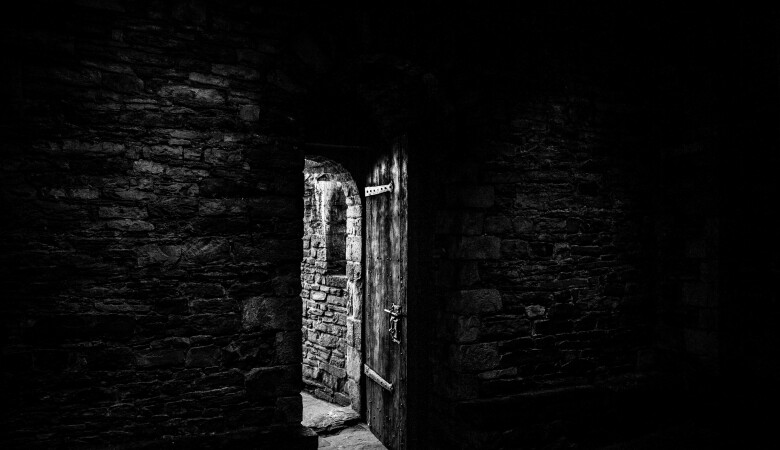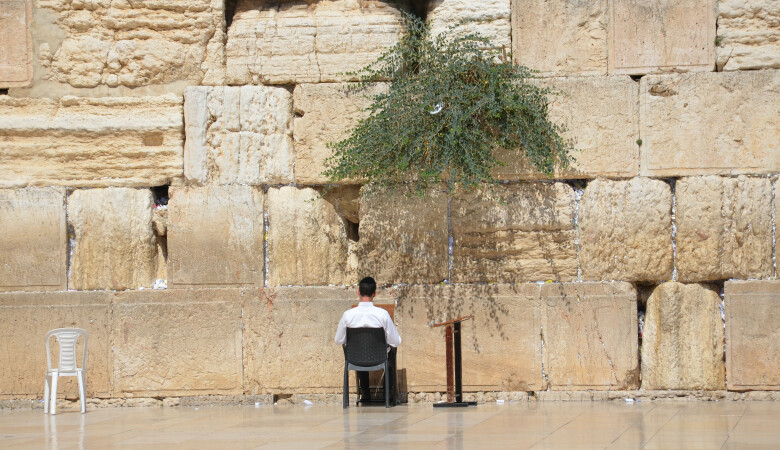Series: Mark
The Shame of the Cross Produces the Glories of Heaven (Mark Sermon 85)
April 14, 2024 | Andy Davis
Mark 15:16-32
Humiliation of Christ, Atonement, Israel's Rejection of Jesus
Jesus bore our cursed crown of thorns and was nailed to the bloody Roman cross, his loving sacrifice for us transforms the shame of our sin into glory.
- SERMON TRANSCRIPT -
Turn in your Bibles to Mark 15:16-32. As we continue to make our way through this glorious Gospel of Mark, we come at last this morning to the account of the crucifixion of Jesus Christ, our savior, in the most shameful and degrading and excruciating way imaginable. Though Christ's physical sufferings were immense, they were no different than those suffered by thousands of others whom the Romans crucified in that era, even two others who died in the same way that very day. The Gospel writers do not go into any great detail about the mechanics and physical horror of crucifixion. At the critical moment in our narrative today, Mark simply writes, "And they crucified him." Look at it right there on the page, verse 24, "And they crucified him." That's all. Simple. Nothing more.
We know that infinitely greater than Christ's physical sufferings were His spiritual ones. He was bearing the wrath of God against the sins of the world, and the passage we will immerse ourselves, God-willing, next week in Mark's Gospel will give us an opportunity to draw that out more fully when Jesus cries out, "Eli, Eli, lema sabachthaniwhich," means, "My God, my God, why have you forsaken me?" God-willing, next week, we will plumb the depths of that reality for that makes Jesus' suffering literally immeasurable, immeasurable, far greater than any ever suffered by any human being in all the epochs of time.
But this morning, in addition to simply walking through the account to establish again in our mind the facts of the crucifixion and of the cross, I want to focus this morning on one dominant theme, and that is the shame that Jesus endured for us. Shame. I want to focus on the shame, the degradation, the humiliation, the mockery that Jesus went through, and how His blood shed on the cross transforms that shame into glory, eternal glory. From shame to glory, that's basically my sermon today.
My focus is on the hearts of people as they esteem Jesus, as they look upon Him, their appraisal of Him, the way they treated Him that day, and the way that the redeemed will treat Him for all eternity. The Gospel writers linger much more on the shame, the shameful degradation of Jesus Christ by sinners than they do, as I said, on the physical details of the crucifixion, so I want to unfold that shame. I want to talk about how in the hearts of those He came to save, there was an infinite movement of degradation and shame to eternal glory, praise, worship, and honor given to the crucified Lord.
For me, the main idea of the sermon came from a meditation on Hebrews 12:2. Listen to what that text says. There the author of Hebrews says, "Let us fix our eyes on Jesus, the author and perfecter of our faith, who for the joy that was set before him endured the cross, despising or scorning its shame, and sat down at the right hand of the throne of God." That has been incredibly dominant in my mind the last two or three days, how Jesus thought it little to go through the kind of shame we're going to talk about this morning.
He thought it a small price to pay to bring eternal joy to you and me. Jesus endured overpowering shame for us. He did this, I'm going to make the case, because there is a reasonable shame connected with sin, and He was our sin bearer. So part of our atonement was that He should be shamed. In bearing our sin, He bore the shame connected with it. But He did it to free us from the ultimate and eternal shame of being condemned to hell. There is no shame on earth that even compares with that shame, so that we would be delivered from shame on that great and final day.
"Jesus endured overpowering shame for us. He did this …because there is a reasonable shame connected with sin, and He was our sin bearer."
He considered it a small price to pay to do that, for the joy that was set not just before Him, but before all of us. We are, because of the atonement, the blood shed on the cross, trophies of His grace, we're going to celebrate the victories of the cross forever. It will not seem shameful in heaven. Not at all. We're going to focus briefly on one trophy of that grace, not in our account, but in Luke's account, and that is the thief on the cross. We'll talk about that.
The cross is truly the center of Christianity. This morning we come to the theological center of Christianity. Everywhere around the world the cross is the physical symbol of Christianity. You see it on top of churches, people wear it around their necks. It's everywhere. But the cross itself is a machine of torture and death, shameful death. Because it is so disgusting and degrading, the cross is effectively a fork in the road for human beings who learn about it.
To be able to see in the implement of torture and death, a display of glory and indeed of all the perfections of God can only happen when the Holy Spirit has worked on your heart and given you faith to be able to survey the wondrous cross and see love and joy and power and victory there. Only the Holy Spirit can work that faith and faith is the eyesight of the soul. To be able to see in a bloody dead Jewish man 2,000 years ago the greatest display of power and love and wisdom there's ever been is a supernatural act of grace to you.
The cross must ever be central. The Apostle Paul knew this. He made the cross the absolute centerpiece of his apostolic ministry. He says in 1 Corinthians 15:3, "For what I received, I passed on to you as a first importance." [Top priority] Christ died for our sins according to the scriptures.” That's the centerpiece of everything. Then he said in 1 Corinthians 2:2, "For I resolved to know nothing, O Corinthians, while I was with you except Jesus Christ and him crucified."
The theology of the cross is clearly laid out in the New Testament in many places. In other words, the explanation of what the cross achieved. You're not going to get that in Mark's Gospel, but you get it in the writings of the apostle Paul and other New Testament writings. What did it achieve? What happened at the cross? Paul writes in Colossians 1:19-22, "For God was pleased to have all his fullness dwell in Jesus, in Christ, and through him to reconcile to himself all things, whether things on earth or things in heaven, by making peace through his blood shed on the cross. Once you were alienated from God and were enemies in your minds because of your evil behavior. But now he has reconciled you by Christ's physical body through death to present you wholly in his sight without blemish and free from accusation." I would add in light of the sermon theme, without shame, without shame. Or as he says later in Colossians 2:13-14, "God forgave us all our sins, having canceled the written code with its regulations that was against us and stood opposed to us."
He took it away, nailing it to the cross. The law of God stood opposed to you because you violated it, because you broke the commands of God. It stood against you and accused you. He took all that away, nailing it to the cross. This is the theology of the cross. We don't get that in Mark 15, we get it later. This is what came. For this reason then, the Apostle Paul said that the cross was Paul's boast. It was his glory. It was his story.
I like what he says in Galatians 6:14, "May I never boast except in the cross of our Lord Jesus Christ through which the world has been crucified to me and I to the world." The cross was Paul's boast and it should be ours as well. But before we even get to the theology of the cross, we need the facts of the cross. Did it happen or not? What's the history? That's what the gospel writers do for us. That's what Mark does for us. What actually happened? If it didn't happen, there's nothing to talk about, but it did happen.
I. Christ Mocked by the Soldiers
Mark gives us the facts. That's what the Gospel of Mark is for, to lay out the history of Jesus' crucifixion as the basis of our faith. Now, where are we at in Mark's account? Remember, Jesus had two phases of his trial, the religious trial and the civil trial. The religious trial has concluded, the Sanhedrin led by the corrupt high priest has condemned Jesus to death and handed him over to the Romans. The civil trial is over now as well in terms of where we're at in Mark's gospel.
The Roman governor Pontius Pilate buckled to the will of the chief priest, teachers of the law and elders and of the people and handed over to be crucified a man he said three times in John's Gospel was innocent. In Mark 15:15, it says, "Wanting to satisfy the crowd, Pilate released Barabbas to them. He had Jesus flogged and handed him over to be crucified." This begins then the public shaming that I've mentioned that will be the dominant theme of the sermon. Jesus is handed over to the soldiers and look what they do. Christ is mocked by the soldiers. Look at verses 16-20, "The soldiers led Jesus away into the palace that is the praetorium and called together the whole company of soldiers. They put a purple robe on him and then twisted together a crown of thorns and set it on him. And they began to call out to him, 'Hail king of the Jews.' Again and again, they struck him on the head with the staff and spit on him. Falling on their knees, they paid homage to him. And when they had mocked him, they took off the purple robe and put his own clothes on him. Then they let him away to crucify him."
The palace, which Mark calls the praetorium, was the headquarters of the Roman soldiers there stationed in Jerusalem. It was Fortress Antonia. The scourging has already happened. It was part of the trial and the process is recorded in great detail in John's Gospel and just quickly mentioned in Mark 15:15. The scourging has happened, and we mentioned last time how horrible the scourging would've been. It could have been fatal if it went on long enough, ripping pieces of flesh off of Jesus' back.
He's bleeding profusely at this point, but the soldiers have no mercy on Him whatsoever. They take Him into the headquarters. They start to play games with Him. They mock Him. Verse 20, “they mock him.” They bring Him to public shame. The mocking of a prisoner like this, acting like he's a king or an emperor, this is something the Roman soldiers frequently did. I think it's a way of them venting their feelings about the emperor perhaps or about their posting there and Judea, et cetera. They would do this. They would take a peasant or someone with special needs or just an average person and they'd put a kingly robe on him and a crown and then bow down to him like he was an emperor. They did this to Caligula right before they made him emperor thinking he was not qualified, et cetera.
It's very interesting. They do this regularly. The soldiers may have known about Jesus' miracles and who He was. They may have heard about the triumphal entry and all that, but they definitely knew what the charge was against Him. “This is Jesus, King of the Jews.” There's no doubt about that. They're going to run with it. They take that idea and they run with it for their mockery. They called together the Roman cohort, battalion, in one translation; a cohort is about 600 soldiers. I doubt that that huge number was there, but there's a lot of soldiers there.
They gather around. Shame is all about public exposure. Shame is horizontal societal force. They're coming to gawk at Jesus and do things to Him to bring Him shame. To give Him the appearance of a king for their mocking game, they find probably an old scarlet robe like a king would wear, maybe a horse blanket or something like that, and they put it on Jesus' shoulders. They draped it across Him. For a crown mocking or imitating Caesar's golden laurel wreath, they wove together some thorns. Really you could picture very long thorns, and they put it on Jesus' head. These thorns we know as we look at it must be symbolic of the curse that Jesus came to bear. God is a God of symbolism. He's a God of details. It's not an accident that thorns are pressed into the Redeemer's brow. Because we know in Genesis 3, God said to Adam, "Cursed is the ground because of you. It will produce thorns and thistles for you." We know it also says in Galatians 3:13, “Christ redeemed us from the curse of the law by becoming a curse for us.” This is a direct symbol of that happening, Jesus wearing the curse on His head.
To make matters worse, the soldiers took a staff, you can imagine like a broom handle or something like that, like a rod, and smashed the crown of thorns down into His scalp, into His brow, causing blood to flow. They also gave Jesus a flimsy reed as a mock scepter. So He's got the robe, the crown, the scepter, and then they fall on their knees mocking Him saying, "Hail King of the Jews." They also spat in His face. Complete degradation. It's the most disrespectful thing I think you can do.
The Jewish guards had already done it to Jesus. So it's twice that people did this to Him, complete disrespect and degradation. And for us, knowing who Jesus is, the second person of the Trinity, incarnate by the Holy Spirit, this is stunning to us that they would treat Him like this. We need to just pause and think about this. Ultimately, Christ cannot be mocked. God cannot be mocked. It says this in Galatians 6:7, "Do not be deceived. God cannot be mocked." Jesus actually is the King of the Jews. We're told in Isaiah 49, it's too small a thing. That title is too small a thing. He's actually king of the universe. He's king of the ends of the earth. He is the king of every king and the Lord of every Lords. And when He comes in glory, He's going to be robed in glory. He'll sit on a throne in heavenly glory. And all the nations are going to be gathered before Him and He will sit in judgment on them. At that point, these same soldiers will be on their knees in front of Him, but not mocking, not at all. So ultimately, Christ cannot be mocked, but temporarily He was. The temporary mocking is what was being poured on him.
II. Christ Humbled by Crucifixion
Next, of course, there's the shaming of the crucifixion. Look at verses 20-27, “When they had mocked him, they took off the purple robe and put his own clothes on him. Then they led him out to crucify him. A certain man from Cyrene, Simon, the father of Alexander and Rufus, was passing by on his way in from the country. And they forced him to carry the cross. They brought Jesus to a place called Golgotha, which means the place of the skull. There they offered him wine mixed with myrrh, but he did not take it. And they crucified him. Dividing up his clothes, they cast lots to see what each would get. It was the third hour when they crucified him. The written notice of the charge against him read the King of the Jews. They crucified two robbers with him, one on his right and one on his left.”
This continues the public shaming of Jesus. He's paraded through the streets of Jerusalem. Verse 20, “They led him out to be crucified.” Isaiah 53, “He was led like a lamb to the slaughter.” The way out of the city by this time was crowded with people. It was about nine in the morning, and they're all out. Luke 23:27 says, "A huge crowd of people followed him." They're all watching. This is the public shaming going on here. It was shameful to have everyone gawking at Him. Public humiliation is one of the greatest fears that any human being has. If you look in your heart, you know it's true. That you would be stripped of honor in front of an onlooking hostile crowd would be one of the greatest fears we ever have. This is what was going on that dreadful morning as He's being processed through the streets of Jerusalem.
There was a shame to His physical weakness as well, because it seems He couldn't make the journey, He didn't have enough strength. It's implied that He fell under the weight of the cross. You should picture not the whole cross, but probably just the cross beam, that would've been heavy enough, and He's carrying that. Because of the loss of blood, He needed some help apparently, so a man named Simon was pressed into the service to help Him carry His cross.
We're told he's from Cyrene, which is a port city on the southern coast of Mediterranean Sea, modern day Libya, almost certainly a Jewish man. A pilgrim would come from that distant place to Jerusalem for the feast. Mark also tells us, interestingly, he was the father of Alexander and Rufus as though his readers would know who that is. You know Alexander and Rufus. Most scholars believe that Mark wrote for a Roman audience, that he was the mouthpiece of Peter who was in Rome, and so that's quite likely. Putting all things together, we find another Rufus in Romans 16, verse 13. Paul greets Rufus and his mother “who has been a mother to me too.” I always picture the typical loving Jewish mother who says, "You're looking a little thin. You need a little chicken soup," or something like that. But this mother of Rufus has been a mother to Paul too. We don't know for sure if it's the same Rufus, but it's not that common a name, so it's quite possible. It's Simon, his wife, his sons, Rufus and Alexander. All of them became followers of Christ. It wouldn't be shocking if it began that dreadful morning with Simon helping to carry Jesus' cross.
Concerning Jesus' weakness, it is interesting that it seems quite possibly He was almost ready to die in Gethsemane. Remember how He was sweating great drops of blood and was overwhelmed with the vision, I believe, of the cup that He would drink? God dispatched an angel from heaven to strengthen Him, but He didn't give Him supernatural power like Samson or something like that. He gave him enough physical strength to get up off the ground there in Gethsemane and go die for us. We see His frailty and His weakness as He's carrying His own cross.
Jesus was also shamed by the location of the crucifixion. It was outside the city gate. The author of Hebrews explains this for us, the significance of this. In Hebrews 13:11-13, it says, "The high priest carries the blood of animals into the most holy places, a sin offering, but the bodies are burned outside the camp." Jesus also suffered outside the city gate to make the people holy through His own blood. Let us then go to Him outside the camp bearing the disgrace, or I could say shame, that He bore. There's a shamefulness to being kicked out of the city, being brought beyond the city gate and dying outside the city gate like He's a piece of garbage or refuse. It was carried outside so there wouldn't be disease in the camp and also a picture of the degradation and disgust of sin.
The author of Hebrews urges us as Christians to be willing to stand with Him outside the gate and bear the shame that He bore. We'll get to that one more time at the end of the sermon. The place is called Golgotha, Calvary. In Aramaic it means “the place of the skull." Some scholars think it was that way because it was shaped like a skull, but it was the place of execution. To go there is ultimate shame. By the way, just in passing, the Latin word for skull is “calvaria.” The Latin translated Bible, The Vulgate, was Europe's Bible for centuries. It's interesting when scholars translated the translation that became the King James Version, they oddly kept the word Calvary in one verse in Luke 23:33, even though it's not in any way directly connected to any of the original languages, not to Hebrew or Aramaic or Greek. It's just the Latin word for skull, so it stuck there. Do you realize how big that word is? I was talking to Wes. We have like 20 Calvary hymns. I rode my bike yesterday by Calvary Baptist Church. It's everywhere, but it's only in one place. It's in the King James Version of Luke 23:33. That's where it comes from, the place of the skull.
Again, this place was a very public place where Jesus was absolutely stripped of His dignity and His honor physically, humanly. It was a very public place. It was right by the roadside. He would not have been up very high. You probably could have gone face to face with Him. People walked by and were able to look right at Him and see Him in that degradation. They walked by and made snarky and insulting comments to Him as He was stripped and shamed.
He was shamed also to some degree by the sedative that they offered, which He refused to drink. Often to help the prisoners, they offer a wine mixed with myrrh. It's a sedative to help dull the pain. Jesus refused it. It seems to me He wanted the full experience. He wanted to drink the cup the Father had given Him to drink to the bottom, to the bitter dregs. He didn't want to be in any way sedated as He went through it.
And of course, shame by the crucifixion itself. I can't imagine a more disgusting, shameful, degrading way to die. It's one of the most vicious and most cruel forms of punishment ever devised. Behind all of the shame is human wickedness. You understand that? Behind all of this is human wickedness, human to human wickedness. There's no requirement that people who commit capital crimes be killed in such a vicious, cruel way, but that's what crucifixion was all about. It was invented it seems by the Persians somewhere around the 6th or 7th century BC. What makes crucifixion so horrible is it's both hideously painful and not directly fatal. Some victims can last for a day or more on the cross. Pilot was shocked that Jesus had died so quickly because there's nothing directly killing them. Their bodies are laid out on the ground on the cross. Their hands are fixed to the cross by long spikes driven through the wrist, each wrist, not the hand, because I'm sure they found that the hand bones were not strong enough to support the entire weight of the body. So it went through the wrist, but it's considered hands metaphorically. Then the feet generally across one on top of the other and one long spike driven through them both. The cross is lifted up and dropped into a hole prepared for it with a jolting thud, sending spasms of pain through the victim's body. The victim sags down on his arms under the weight. Then to breathe, he has to push up on his spiked feet to get breath, and then he sinks back down again. He has to keep doing this to breathe. Generally, the victims die through asphyxiation. They just stop making the effort to breathe.
Death is often hastened by breaking the leg bones of the victim so that he can't push up anymore. That is exactly what the Roman soldiers wanted to do to Jesus, but Jesus, in complete control of his death, the timing of it, gave up His Spirit. He said, "No one takes my life from me, but I lay it down of myself." When all the scriptures were fulfilled, He gave up his Spirit. He died. We’ll talk about that more next week. But the soldiers were just coming around to smash his leg bones and they wouldn't do it. They couldn't do it because He was already dead, thus fulfilling the scripture. Not a single one of his bones would be broken.
Jesus while being crucified is also shamed by their gambling for His clothes. “You won't be needing these anymore. All of your worldly possessions are gone. You have no need for them anymore.” It's like the vultures circling overhead. Of course, it's a fulfillment, direct fulfillment of Psalm 22. We'll get into that next week, the fulfillment aspect. But it's shaming for them to take His clothes and in front of Him gamble for them.
He was shamed also by the inscription. Pilate ordered a sign over His head, “The King of the Jews”, written an Aramaic, Hebrew, and Greek so everybody could read it. Pilate did it to mock the whole Jewish nation. I'm sure he was more than sick of these people, and he wanted to just stick it to the Jews. So he said, "Look at your king. This is what your king looks like. Behold your king." In John's Gospel, they're very angry about this and said, "Do not write King of the Jews, but this man claimed to be King of the Jews." He said, "What I have written, I have written." It's humbling for Jesus because the Jewish nation as a whole had directly rejected Him as king over them. "We will not have this man as our king. We have no king but Caesar," they said.
However, isn't it wonderful that I believe the text over his head, the King of the Jews, may well have been instrumental in the thief coming to faith. Because what did he say? “Remember me when you come in your kingdom.” And so it could be that God used that to get the man thinking. We'll get to that more in a moment.
Finally, He was shamed by being killed with common thieves, with common thieves, probably highway robbers, a threat to everyone on the road. Jesus was killed with others just like He was just any other criminal.
III. Christ Mocked by the Citizens, the Priests, and the Thieves
But it's also a picture of the atonement. “He was numbered with the transgressors,” Isaiah 53 says. He was included with us. In that sense, He was no different than they were. Jesus was also shamed by the citizens and the passersby as they walked by. The passersby mocked. Look at verse 29-30, “Those who pass by hurled insults at him, shaking their heads and saying, ‘So, you who are going to destroy the temple and build it in three days, come down from the cross and save yourself.’ Throwing his own words so they thought to him.” He never said He would destroy the temple. He said, "You do the destroying, I'll do the raising." They were in the process of destroying the temple, He meant, and He would raise it on the third day. But they're mocking Him, insulting Him. This is more than kicking someone when they're down. He's dying on the cross and they think they'll go by and throw a few verbal javelins at Him. The priests do the same thing. This is their hour of triumph. They've wanted Him dead for years.
Now He's dying. But they can't help but go mock Him in the same way the chief priests and the teachers of the law mocked Him among themselves. "Oh, He saved others," they said, "but He can't save himself. Let this Christ, this King of Israel, come down now from the cross that we may see and believe." Of course, if He had done that, their believing wouldn't have done them any good. The entire world would sink down into hell for our sins if He had come down off the cross. They had no way of understanding that.
Even the thieves, plural, mocked him. Verse 32, “Those crucified with him also heaped insults on him.” This is wave upon wave of shame that has been laid on Him. It's absolutely over the top. I see Satan behind it, the hatred he had for this man, and he incites human beings to pour it on in this sense. But this is the shame that Jesus thought little of. Just ponder that for a moment. Jesus was willing to pay that price to save you and me. Hebrews 12:2, "Let us fix our eyes on Jesus, the author and perfecter of our faith, who for the joy that was set before him endured the cross." Many translations have the words “despising its shame.” The word despise we generally think of wrongly at least in that sense of hating. Like “I despise you" means "I hate you.” But the word there, the Greek word behind it, means “thought little of it,” looked on it as a small thing. Jesus understanding full well this horizontal shaming that's going on here thought it a small price to pay to save you and me.
For the joy that was set before Him was His own joy at seeing you redeemed, seeing you around His throne in heaven. “Father, I want those whom you have given me to be with me where I am and to see my glory. I want you to have that joy, and I'm willing to pay this price to have it happen.”
IV. But Christ Despised the Shame, Winning Trophies of Glory
Let's talk about a symbolic real trophy of that cross. Go over to Luke 23:39-43, it’s not in Mark. Mark tells us both of the thieves reviled Jesus, and so they did. Every word of scripture is true. But this is the beauty of comparing the synoptic accounts one with the other. Because it seems that though one of the thieves, though both of the thieves heaped insults on Jesus, one of them later changed his mind. Look at the account in Luke 23:39-43, “One of the criminals who hung there hurled insults at him. ‘Aren't you the Christ? Save yourself and us.’ But the other criminal rebuked him. ‘Don't you fear God,’ he said, ‘since you are under the same sentence? We're punished justly for we are getting what our deeds deserve. But this man has done nothing wrong.’ Then he said, ‘Jesus, remember me when you come in your kingdom.’ Jesus answered him, ‘I tell you the truth, today you'll be with me in paradise.’"
This is stunning, maybe in some ways the most stunning and dramatic conversion in the Bible. I mean, right up there with Saul of Tarsus. Why? Because there was so little time and so little new evidence. Jesus didn't do any miracles, no new teachings, nothing. He was at His absolute physical visible worst. So what happened? To get an insight of what happened, you have to go to Caesarea Philippi in Matthew 16 where Jesus asked his disciples, “'What about you? What do you say that I am?’ Peter answered for all believers saying, ‘You are the Christ, the Son of the living God.’” What did Jesus say to Peter? "Blessed are you Simon, son of Jonah, for this was not revealed to you by man, but by my Father in heaven." Stop there. That is true of every genuine conversion. Every genuine conversion gets Jesus revealed to them by the Father through the power of the Holy Spirit or you're not converted. You see Jesus with eyes of faith because the Father sends forth the Spirit to work that in you. Is that what happened with the thief? What else could happen? There's no other way to be saved. The Father revealed Jesus to the thief on the cross at the last possible instant to save his soul from hell. What did God reveal to the thief on the cross? He revealed the true identity of the bloody dying man next to him, a coming king who would have a glorious kingdom in the future.
Behind that then, apparently, this is not Jesus' final kingdom day, so that implies the possibility of resurrection from the dead. He did not expect to be saved from the cross, the thief. He just said, "When you come in your kingdom, remember me." What else did he have revealed to him? God revealed his own sinfulness. “We are getting what we deserve. This man has done nothing wrong.”
He also revealed the possibility of grace to someone who had literally no merit, nothing to offer, nothing in his hands. Just said, "Remember me." “On what basis should I remember you?” “Because you're merciful and gracious and because you love sinners like me. Remember me.” That's an awful lot of revelation by God to that thief on the cross at the last possible moment. Therefore, He gives hope to all of us Christians who have unsaved relatives. You're going one more time to the hospital, one more time and you think, maybe, just maybe this one last time, they'll repent and believe. The thief did it. He is a trophy and he's included in the words “for the joy that was set before him.” “Today you'll be with me in paradise.”
Christ won not just one but many trophies of glory that day. There's so many verses I could go to talk about this, but Revelations 7 may be the most beautiful picture. Revelation 7:9-10. “After this I looked, and there before me was a great multitude that no one could count, from every nation, tribe, people and language, standing before the throne and in front of the Lamb. They were wearing white robes and they were holding palm branches in their hands. And they cried out in a loud voice, ‘Salvation belongs to our God, who sits on the throne, and to the Lamb.’" Many times in the Book of Revelation the redeemed in heaven are depicted wearing white robes. What are those white robes? What do they represent? You know what they represent? A covering of your sin, a covering of your shame. "I counsel you," he says to the church at Laodicea, "to buy a robe to cover your shameful nakedness.” Imagine redeemed people standing in heaven with no shame at all, covered completely in the perfect atoning work of Christ, worshiping Jesus forever. That's the joy that was set before Him.
V. Applications
What lessons can we take from this, what applications? First the cross in heaven when we get there will be the center of heavenly worship. It will not be seen to be shameful at that point. It'll be seen to be radiantly glorious. Jesus is the lion of the tribe of Judah, but He also is the lamb looking as if it had been slain. We'll remember the cross and we will celebrate the triumphs of the cross. It says in Revelation 5:9-12, “They sang a new song, ‘You are worthy to take the scroll and to open its seals, because you were slain, and with your blood you purchased men for God from every and language and people and nation. You have made them to be a kingdom and priest to serve our God, and they will reign on the earth.’ Then I looked and heard the voice of many angels, numbering thousands upon thousands, ten thousand times ten thousand. They encircled the throne and the living creatures and the elders and in a loud voice they sang, ‘Worthy is the Lamb, who was slain, worthy to receive power and wealth and wisdom and strength and honor and glory and praise!’" That's the esteem with which Jesus will be focused on in heaven and the cross is at the center of it. Isn’t it beautiful to go from shame to glory? Not just Jesus, but us.
Marvel at the mindset of Jesus. You ever feel like you're not loved? You feel lonely? You feel isolated? If you're a Christian, go to this. Jesus thought all of this shame, a small price to pay for the joy of bringing you to heaven. Think about that. For the joy that was set before Him, all of the things that were done, the crown of thorns and the purple robe and the spitting and the flogging and then the parade through the city and the mocking and all of that shame, small price, a small price to pay to bring you eternal joy.
"You ever feel like you're not loved? You feel lonely? You feel isolated? If you're a Christian, go to this. Jesus thought all of this shame, a small price to pay for the joy of bringing you to heaven."
Why the shame? Ponder that. We are becoming an increasingly shameless culture. It's like shame is a bad thing. You ought to be ashamed if you think people should be ashamed. That's about where we're at now. But sin is shameful. We should feel shame for our sin. That's why this happened to Jesus. It's not an accident. It's what we deserved for our sins. It says in Ezekiel 16:63, a horrible chapter of the degradation of the city of Jerusalem in open spiritual adultery against God. It's disgusting. Then at the end of that chapter, He talks about the atonement He'll do for His people. He says, “'Then when I make atonement for you for all you have done, you'll remember and be ashamed and never again open your mouth because of all your humiliation,’ declares the sovereign Lord.”
There is a reasonable shame connected with sin. Jesus came to take that on Himself. Therefore, there is an ultimate shame that we Christians will never experience. It says in Romans 9:33, quoting the Old Testament, "Behold I lay in Zion a stone that causes men to stumble and a rock that makes them fall. And the one who trusts in him will never be put to shame." What does that mean? I think it means Judgment Day. Judgment Day. Picture these words. When the Son of Man comes in His Father's glory and all the angels with Him, He will sit on His throne in heavenly glory and all the nations will be gathered before Him. And He will separate the people one from another as a shepherd separates the sheep from the goats. He's going to put the sheep on His right and the goats on His left.
What would it feel like to have all of your sins, in that text, sins of omission? “I was hungry. You gave me nothing to eat. I was thirsty. You gave me nothing to drink. I was a stranger. You did not invite me in.” Those are all sins of omission. But what about also your sins of commission? The wicked things that God told you not to do and you did them anyway and more times than you could count. Your sins more numerous than the hairs on your head. What will it be like to have all that read out in front of the holy angels and in front of all the people that have ever lived?
And even more, the crowning is to hear these words, "Depart from me you who are cursed into the eternal fire prepare for the devil and his angels." To hear that spoken about you, there is no greater shame than being rejected by God because of your sins. Then go back to Romans 9:33, “Behold I lay a stone in Zion, a chosen and precious cornerstone, and the one who trusts in him [Jesus] will never know that shame.” You will not hear the shame of "depart from me you who are cursed.” You will not hear the shame. You will be free from condemnation, as it says, “There is therefore now no condemnation for those who are in Christ Jesus.” All I can do is ask you, dear friend, is that you? Have you by faith in Jesus trusted in Him so you will not have the shame of eternal condemnation? Do you know Him? Have you trusted Him? That's the purpose of the Gospel of Mark, to bring you to faith in Jesus, to trust in Him.
One final word as I close. To all Christians, we are commanded to come outside of comfortable societal acceptance and stand under the cross where Jesus was shamed and bear the shame that He bore and to do it as a Christian. Let us then go to Him outside the camp bearing the disgrace He bore. He says in Mark 8:38, "If anyone is ashamed of mean and of my words in this adulterous and sinful generation of him, will the Son of Man be ashamed when he comes in his father's glory?"
We have a job to do and the world's going to try to shame us for proclaiming the gospel, shame us for saying, "I'm a Christ follower," shame us for sharing the gospel with lost people. Consider it a small price to pay if you could win some of those people to eternal joy in heaven.
Close with me in prayer. Father, we thank you for this meditation this morning on what Christ endured for us. We thank you for his willingness to drink shame to its bitter dregs so that we could not feel shame on judgment day and for all eternity. Thank you. And Lord, I pray that you would take the seed of the word that has been scattered now throughout this time and allow it to bear fruit in our hearts by the working of your Spirit. In Jesus' name we pray, Amen.































